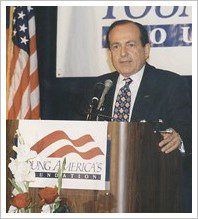By: Raj Kannappan and Karl Stahlfeld Andy Puzder is a popular Young America’s Foundation speaker and ally. He was chief executive officer of CKE Restaurants, the parent company of Hardee’s and Carl’s Jr., for more than 16 years. Prior to that, he led a successful career as an attorney. He is currently a Senior Fellow at the Pepperdine University School of Public Policy. He was nominated by President Donald Trump to serve as U.S. labor secretary. Puzder is the co-author of Job Creation: How It Really Works and Why Government Doesn’t Understand It, The Capitalist Comeback: The Trump Boom and the Left’s Plot to Stop It
, and Getting America Back to Work,
a forthcoming broadside from Encounter Books. YAF: First, how are you and your family doing during the coronavirus pandemic? Puzder: We’re doing fine. We’re blessed that this crisis happened now instead of 10 years ago because we have all of these online delivery services available. You can get anything you want on Amazon and other places as long as they have enough supplies. My wife and I have been taking advantage of that.
YAF: This crisis is hurting the U.S. economy. What are the biggest economic challenges you see? Puzder: This is not a natural disaster. Rather, it is a
national disaster. Like in any national disaster, the federal government is doing everything it can within its power to protect Americans and the economy. The biggest challenge will be for the federal government to back off once the crisis is over. As President Reagan said, “No government ever voluntarily reduces itself in size.” The government is going to need to do exactly that if we’re going to recover once the crisis ends—and the crisis will end. Another challenge is to get people back into the economy. We need stores, hotels, and restaurants back open. We need manufacturers to manufacture and consumers to consume. That requires incentivizing investors to invest, businesses to hire, and workers to work. It requires that we do not have policies in place that discourage work and investment. We need free market policies. We don’t need to undergo what we went through following the Great Recession under President Obama, when we ended up with laws and regulations that actually restricted economic growth. We need to do what President Trump did when he took office—reduce taxes and regulations, develop domestic energy resources, and get out of the way so businesses hire people. Then, of course, there is the medical challenge. People need to feel safe. If people don’t feel safe, they’re not going to do the things they were doing in December and January, before the crisis began.
YAF: How do you evaluate President Trump’s handling of this crisis? Puzder: He’s doing an amazing job. He’s using every tool the government has and his personal skills to address the crisis, including engaging the private sector. He acted early when he restricted travel from China and Europe. He was criticized for overreacting, but a few weeks later he was criticized for not acting strongly enough. Like any great leader, he ignores the criticism and keeps doing what needs to be done. He placed Vice President Mike Pence in charge of the coronavirus response team, which was a great move. The President has wonderful medical experts advising him, and the American people can hear from him and his team on television every single day. The President also helped get an unprecedented relief package through Congress to help the American people. It’s not a stimulus package, but a survival package. The President is providing the leadership that Americans expect, and the polls show it. He gets criticized for responding to the press, but he’s standing up for himself and the country. His job approval numbers are higher than ever. That stands in contrasts with the poll numbers on how the press is handling the coverage of the crisis.
YAF: The President has leaned on the private sector to help the country during this crisis. Yet, some argue that it is solely the responsibility of the federal government to combat this pandemic. How do you respond to that? Puzder: We’re all in this together. This is a national crisis. In fact, it’s an international crisis. There is a long history of the private sector helping America during times of crisis. It’s nonsense to argue that the private sector can’t help or has no role to play. Take, for example, Bill Knudsen. Knudsen was an automotive executive who had incredible experience and success at Ford and General Motors. In 1942, FDR commissioned Knudsen as a lieutenant general in the U.S. Army to lead America’s war materiel production during World War II. Knudsen did an incredible job in this role.
YAF: How are businesses positioned to aid Americans today? Puzder: U.S. companies are already helping the country in so many ways. There are incredible companies now producing and supplying medical equipment that we need. For instance, we needed hospital gowns, so the President went to Walmart. We needed ventilators, so he went to Ford and General Motors. Google is developing a website to help Americans self-diagnose and locate coronavirus testing sites. CVS and Walgreens are making drive-thru coronavirus testing sites available. Employees at grocery stores, restaurants, and online delivery services are putting themselves at risk to help keep Americans supplied. What all of these businesses have done is remarkable.
YAF: How do you anticipate the coronavirus pandemic will affect the U.S. restaurant industry, which employees more than 15 million workers? Puzder: The restaurant industry will change after the crisis. First of all, the impact of the virus has been far less than it would have been five years ago due to the range of third-party delivery services available. People are getting more used to delivery—not just for food but also for other supplies. My 97-year-old mother is now ordering everything on Amazon. A few months ago, if I had mentioned Amazon to her, she would have thought I was talking about a river in Brazil. She’s also getting food delivered through Uber Eats. Some restaurants may determine they don’t need the huge dining rooms they currently have. A Carl’s Jr., Hardee’s, McDonald’s, or Wendy’s may not need the large dine-in spaces that used to fill up when I was growing up and people would hang out at their local fast food restaurant. In fact, the crisis may lead to virtual restaurants. You may be able to order from a brand name restaurant, but the restaurant won’t have a physical dining room. It’ll just have a kitchen and a warehouse somewhere. These changes will create new jobs, so employment in the restaurant sector will remain robust. But the way food is delivered to consumers will change, much like it changed when drive-thru restaurants first emerged. Restaurants that can adjust will do well, while those that cannot won’t be around very long.
YAF: What can Americans do today to help restaurants and restaurant employees in their community—many of whom may be putting themselves at risk? Puzder: When you see these Americans continuing to work hard, thank them. Let them know you appreciate what they’re doing. We’re all rightfully going to thank medical providers, police officers, and firefighters. It’s important to thank restaurant workers as well. A great way to do that is leaving a big tip. They’ll notice that. In terms of helping restaurants, order delivery from your favorite places. Buy some gift certificates from those places so they can have cash coming in immediately and keep their doors open. You can use the gift cards when things have returned to normal. Some restaurants are even offering discounted gift certificates. For example, if you buy a gift card for $80 today, you can redeem it for $100 in the future. Take this offer. It’s to your benefit, and it’ll help keep local restaurants open. On a personal note, I have a grandson who works at a McDonald’s. He’s going into work every day. I called him last night to let him know how proud I was of him.
YAF: There seems to be an endless stream of doom and gloom from the media. Is there any good economic news? Puzder: There are three positive things we need to keep in mind. First, the United States entered into this crisis from a position of incredible economic strength, particularly labor market strength. This provides something of a cushion. While we’re just in the beginning stages of job losses—it’s going to get worse—the employment numbers that came out earlier this month showed that we had 151.8 million jobs. That’s incredible. As recently as last October, we had 151.6 million jobs. So, we had more jobs in March than we did just 5 months ago. We will lose more jobs, but this helps to emphasize just how strong the economy was going into this crisis. Second, the job losses and economic decline we are seeing were anticipated by the government when it shut down the economy. The Trump administration is acting to protect Americans. From the Coronavirus Aid, Relief, and Economic Security Act to legislation on medical leave, the government is getting money into the hands of people who need it and loans into the hands of businesses that need them so they can survive and preserve jobs. Third, this crisis will end. The virus kills people, but poverty kills people too. At some point, we’ll need to move past the crisis mentality and get the economy back online. We do not have a systemic problem with the economy like we did during the technology collapse of 2000, when a number of highly valued technology companies turned out to be worthless, or during the financial crisis of 2008, when we had a real estate bubble. While there are no good short-term economic prospects during the current crisis, if the government gets out of the way, the economy will bounce back. I’m confident that America will get through this.
YAF: What advice can you share with YAF’s students who may be concerned about the economy and their career prospects? Puzder: You live in the greatest and freest nation in the history of the world. You have a President who respects this fact. America has faced crises before and recovered. We’ll do so again. We’ll go forward because of the enterprising individuals in our free market economy. I encourage you to be one of those individuals. Our country is 244 years old if you date it to 1776, when the Declaration of Independence was signed. I’m 70 years old. That means I’ve been alive for almost 30% of the country’s history. My mom has been alive for 40% of our history. If you’re 24 years old, you’ve been alive for 10% of our history. We are a young country, and we have to preserve the precious freedoms we have. There has never been a country with freedoms like ours, and we are still in the throes of this experiment. To quote President Ronald Reagan, “Freedom is never more than one generation away from extinction.” Don’t be the generation that gives up our freedoms.
YAF: Is there anything else you would like to add? Puzder: When I was 10 years old, John F. Kennedy became President. I still have a copy of his inaugural address hanging on my wall. In that speech, he famously said, “Ask not what your country can do for you, but what you can do for your country.” That is the question we should all be answering today.
Raj Kannappan is the director of YAF’s Center for Entrepreneurship & Free Enterprise. Karl Stahlfeld is the associate director of YAF’s Center for Entrepreneurship & Free Enterprise. 



